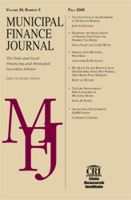The History and Justification for Timely Payment of Statutory Liens and Pledged Special Revenues Bond Financing in a Chapter 9 Municipal Debt Adjustment Proceeding: Is a Model State Law Necessary or Required?
Author: James E. Spiotto.
Source: Volume 39, Number 04, Winter 2019 , pp.47-97(51)

< previous article |next article > |return to table of contents
Abstract:
Recent Chapter 9 filings in Detroit and the PROMESA court rulings in Puerto Rico have raised questions as to the assurance to be paid timely in a Chapter 9 proceeding, creating the perception of more risk than both the government issuers and purchasing bondholders had expected. The 1988 Amendments to the Chapter 9 federal Bankruptcy Code and case law from the 1930s acknowledged the limits on the jurisdiction and power of a federal bankruptcy court and the Bankruptcy Code over state legislative or constitutional mandates as to the use and distribution of tax revenues to pay expenditures such as bond debt. These principles were intended to and should have resolved the questions now being raised concerning the timely payments of pledged special revenues and proceeds of statutory liens to bondholders in a Chapter 9 proceeding. A state statute that clearly and effectively sets forth this irrevocable mandate should be free from contrary interpretations of the federal Bankruptcy Code and from any power of a Chapter 9 bankruptcy judge to rule to the contrary. The author offers a Model State Law to address these concerns.Keywords: Chapter 9 municipal debt adjustments, Bankruptcy Code, automatic stay, revenue bond financing, statutory lien financing, Sections 903, 904, 922(d), 927, and 928 of the Bankruptcy Code, 1988 Amendments, PROMESA, Jefferson County, model state law
Affiliations:
1: Chapman Strategic Advisors LLC.